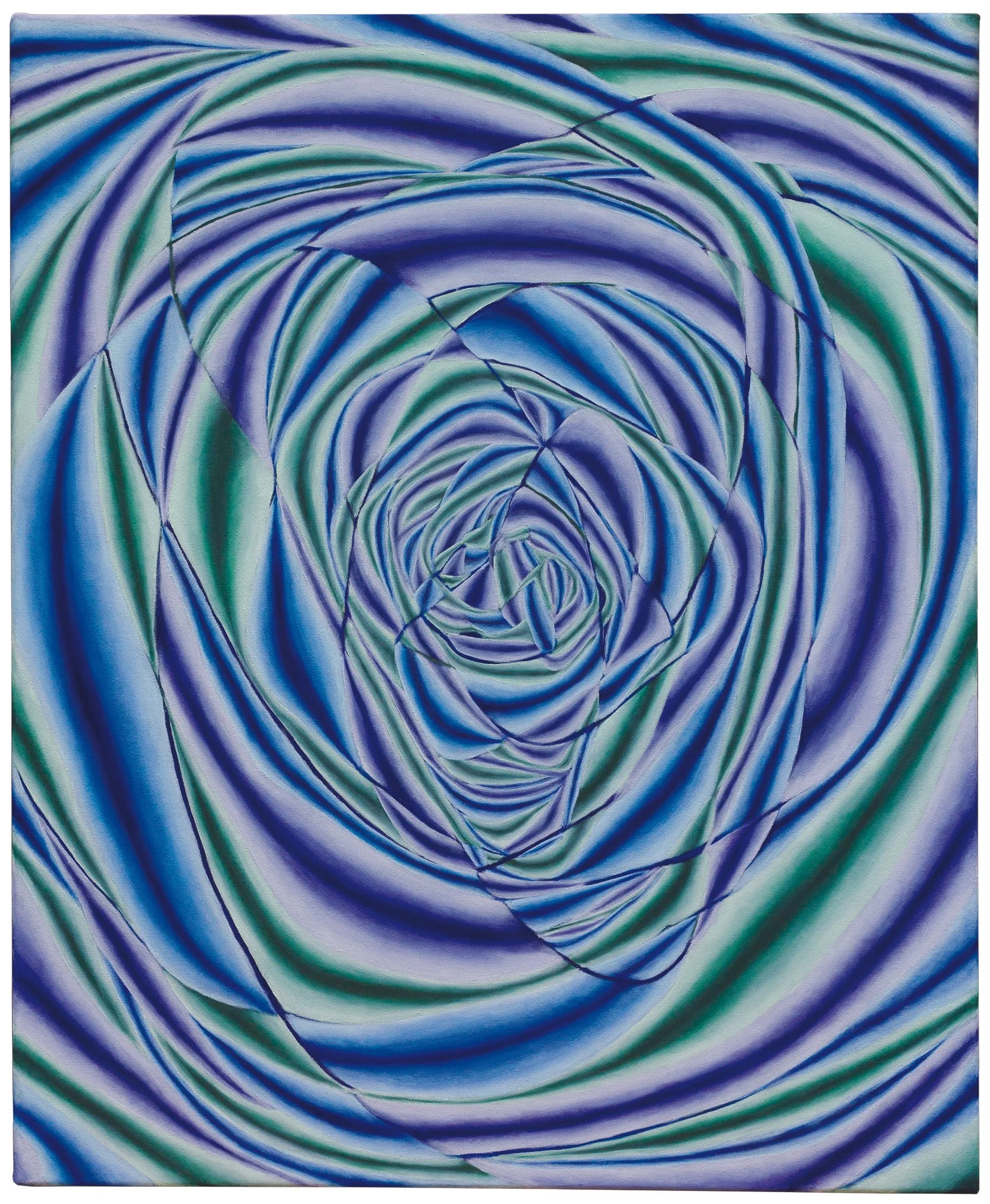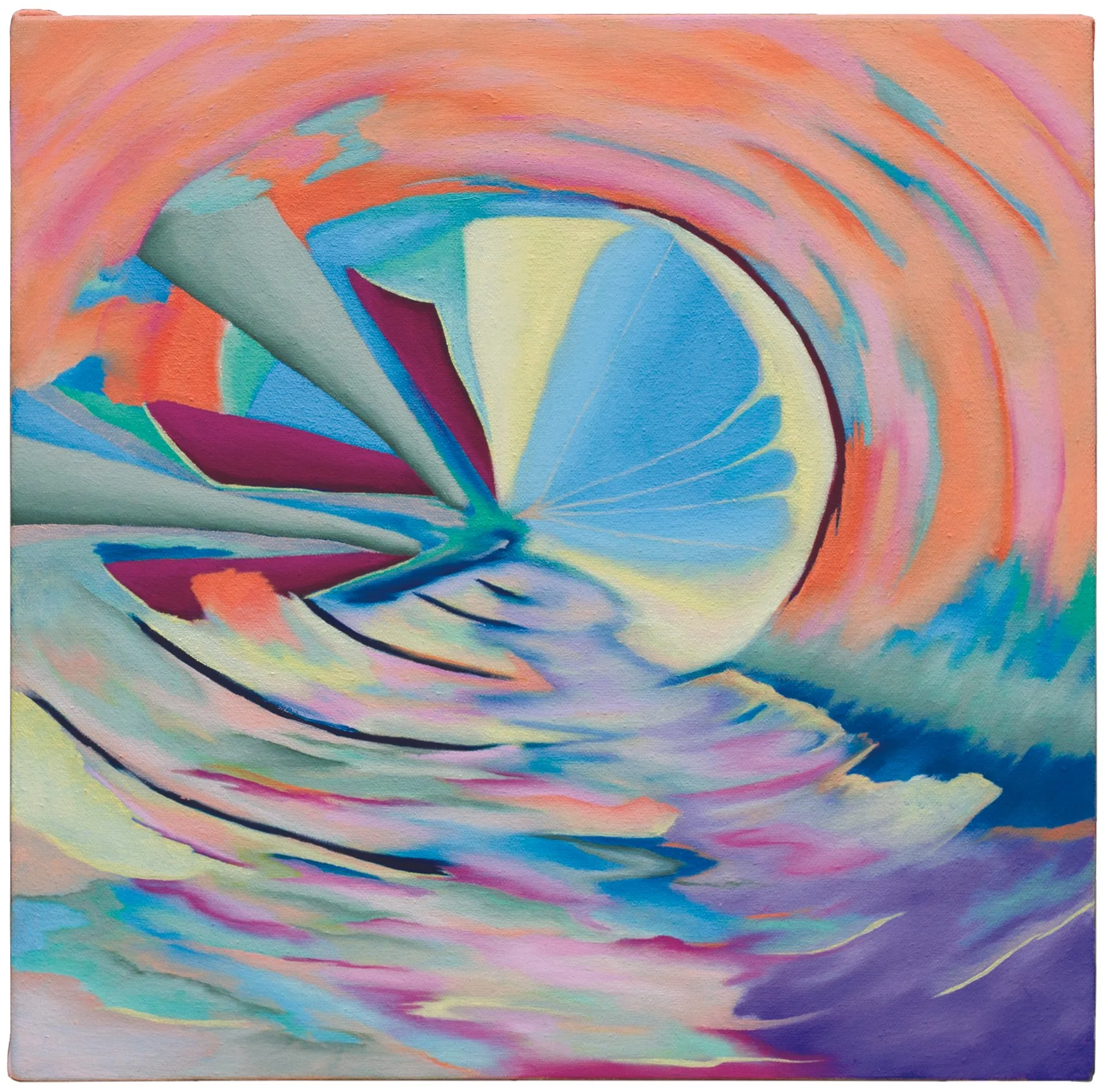Off Starboard
Fiction by Lilly Grey Rudge & Painting by Cori McCullough
PUBLISHED IN BUCKMAN JOURNAL: Trance
You have disappeared into the galley when I see the pink swim cap, bobbing off starboard. I thought it was garbage, at first; a Pepto-Bismol bottle, tampon-taxed-something-or-other thrown overboard. It dips in and out of focus along with the blink of the navigation lights, breaking through the surface in a rhythmic game of Red Light, Green Light. It winks at me, pink then rose then fuchsia, an exceptionally pretty piece of plastic for the Puget Sound to choke on. And it might, if not for the head, shoulders, and strong, splashing legs keeping the cap afloat. I count four limbs churning waves.
The ferry releases a monstrous groan, but the swimmer keeps stride. I press against the window and watch for a gulp of air. Or some hidden propeller, an air tank, a television crew. Her swimsuit is floral. A one-piece with a complex system of straps cutting across her back. There is a sweet, artificial smell, like bubblegum cut with grapefruit and my throat tightens against the vapor. I should look for your inhaler or snatch the pen from our boatmate before you return. He is two booths away, twiddling the plastic cigarette between his fingers, and I wonder if I’m caught in a secondhand stupor. If the swimmer is somehow conjured from the same fruit-flavored particles that are filling the ferry’s narrow cabin. If each detail—the clear curve of her stroke; the creeping wedgie from her swimsuit; the small, blooming flower at the apex of her cap, which flops back and forth, back and forth—is a trick of the nicotine and heavy metals that my raccoon-faced neighbor is sucking down. But his large, smudgy eyes are trained straight ahead, far afield from the bobbing flower that is, when I glance back, well on its way to becoming a bouquet.
These new scalps are almost identical to the first. The same silly flower, blooming from the crowns of the heads with similar assortments of limbs motoring them along. Color is what sets them apart from each other—one a deep tangerine turned severe by the boat’s strobe, another a chalky blue, a third a dull brown renewed by a multicolored plume of petals. I count ten before another four, five, seven break the surface. What was a lone swimmer has become a pod, paddling to some internal, synchronized beat that I am straining to catch over the rumble traveling from the engine through the floor and up into my feet. Perfect ice-cream scoop hands pull long strips from the sea in exact tandem and I begin humming, inventing a tune for the group to interpret. Only when I reach an especially exultant note do they flip to their backs, breaking my accompaniment. Their arms open wide like wings and I don’t see the spiral until it is fully formed, circling in on itself like something from an Esther Williams film, a real-life Aqua Musical.
Tunnel Vision
This time, when I look around, I see a larger smattering of passengers, their heads resting against shoulders, tables, or the edge of windows. No one comments or points. Spines sag and hairlines recede and thumbs tap and skim, or are buried in the armpits of those sleeping. Just below the engine’s rumble the water is thrashing itself against the hull, tugging at the bolts and rivets with a new ferocity. It is almost impossible to see anything beyond the black waves that are rising foot by foot. There is a dash of yellow and blue and that first bright pink dipping in and out of the violent waters, traveling closer with every rock of the ship. I watch them paddle against it, still in unison, arms and legs moving in rhythm. But the angle of the bow is changing, actively working to close the distance and plow forward. Perhaps, despite their florals, the captain can’t see them from the bridge. The boat catches a precipitous wind and rocks fiercely, making my forehead meet the window. I peer through the glass with fuzzy eyes. The first flower I find is yellow and my eyes trace its shape until it is swallowed in a reverse germination that has me calling out for you—or for anyone who will acknowledge the bodies being devoured by the rising waves.
The attendant who answers has dark circles under her eyes. She does not make eye contact. When I point to the window and speak, she squints, then straightens her tight black tie. The neighboring tables seem annoyed to be roused. They all shake their heads, scalps leaving spots of grease where they lolled against the windows. I left my ID in the car but show her my ticket. I wonder if she wants to smell my breath, but then she is saying something about sea lions while fiddling with her radio. She turns to leave and I ask after you, offer a description to go with your name. She will keep her eye out, her back tells me. When I turn, the swimmers have gone, too. No more brightly colored arrangements or bodies bending into geometrically pleasing shapes. The waves keep coming, licking up against the window pane, no doubt climbing over the deck. I imagine the swimmers, limp-limbed, their bones breaking against the hull. Children stream through two sets of double doors into the cabin, their legs and feet soaked from the spray. They are chattering, voices high and clear, but not about the synchronized display. One parent jostles past me, calling after her dripping toddler who is stumbling through the cabin, exploring her newly-discovered ambulatory freedom. A trail of puddles mark her path and it only takes one overly zealous step to send her tumbling forward with a piercing wail which harmonizes with the sudden chime of the PA system.
“Attention passengers. If you direct your attention off starboard, you might be able to spot an adult orca. Orcas breach approximately every three to five minutes, so make sure to keep an eye out.”
There is a shuffle and the windows grow wet with breath. I am scared for a moment that the ship will tip with this change in balance. The same parent as before brushes against my shoulder, her daughter rescued from the floor and hiked high on her chest, pressing a small, urgent finger against the window. And then you are on my other side, telling me to look. That you can see it, just there, a little to the right! The woman nods and exclaims that yes, there it is! But my eyes have stopped skimming the surface, locked squarely on one final, lifeless flower.
It is such a deep crimson that I would have missed it, if not for the sharp line of vertebrae still connected to it by a now broken neck; spine snapped by the starboard side. There is an intake of breath and enough exclamations that I know the whale has breached. The wave that follows is the largest yet and I watch as it lifts the blossom into clearer view. I can see the pistils now, cheap and plastic, and the misplaced shag of hair peeking out beneath them. If I were on deck I might grab for it, palm my hand around the stretch of scalp. As it is, I study the sheen of silicone for as long as I can and, once it is gone, the spatter of dark red pollen left behind.
and then, and then
Lilly Grey Rudge (she/her) is a Pacific Northwest writer with a love of the odd and macabre. Hailing from Seattle, Washington, Lilly Grey wrote her first short story at nine years old, which featured an alarming amount of disembowelment. Now residing in Portland, Oregon, her work has been previously featured in Pile Press. When not writing, she can be found working in school communications and playing existentially overwhelming board games.
Cori McCullough (they/them) is an artist exploring color and form as a narrative where language falls short. They are fascinated with how outer experiences form into inner landscapes. They are searching for a delicate balance between movement and stillness, creating a place for a soft landing, a deep breath. The subtle intricacies of layers emerge, inviting a moment to take pause, raise questions within.


